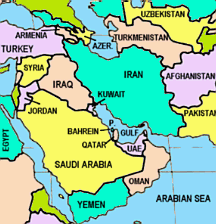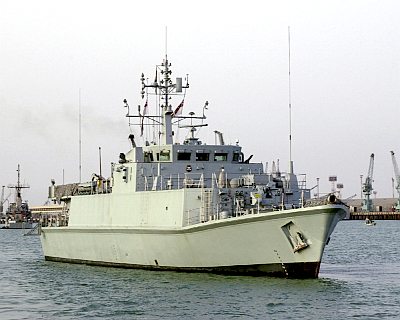A couple of days ago I asked our readers to speculate on the reasons why President Bush, against the tide of his party and most of his conservative base, was digging in so hard on the UAE-ports deal. I didn’t want to argue the merits of the case — there’s plenty of room for argument — but to understand why this veto-shy President is so gung-ho to push the deal through.
Most of the commenters simply argued the pros and cons for the deal, instead of doing a serious analysis of what Mr. Bush thinks he’s up to.
But then last night, in Dymphna’s latest post on the topic, Freedom Fighter showed up in the comments and referred us to his blog, Joshua Pundit. He’s done some pretty shrewd analysis of what’s going on, and gives us an explanation and strategic overview of what’s happening.
I’ll quote here from two of his recent posts.
First, he has the same reservations as the rest of us about the way this deal was handled:
Another aspect that bothers me, frankly, is President Bush insuting my intelligence. On the one hand, the White House stated that neither President Bush nor Treasury Secretary Snow knew about this until it was a ‘done deal’. Yet President Bush, three days later is threatening to veto this and saying that a deal he supposedly knew nothing about is interfering with his ability to conduct foreign policy? I don’t expect or even demand truthfulness from the president on every occasion, but this is a bit much.
[…]
I also am extremely suspicious of the high powered lobbying that’s going on, the ‘Islamophobia’ card that’s being played and what I consider to be the Bush Administration dissembling on this from the beginning. Not to mention that ex-president Jimmy Carter favors this deal!
The President needs to sit down with Congress and make the necessary changes needed to reassure them that this deal is necessary and more important, completely vetted as far as our security goes. The President needs to make a case for this action.That aspect was handled poorly from the very beginning, and as I said, doesn’t pass the smell test.
In the second post he asks the same basic question I did:
I think it pays to ask the question: why is President Bush so exercised about a simple comercial transaction? Especially one opposed by both the Senate and House Majority leaders in his own party? What is so important that he is threatening a veto of any legislation blocking this, when he hasn’t vetoed anything in five years?
I think I know, or at least have an idea.
You have to start with two logical premises: one,that President Bush is NOT an idiot(though certainly capable of mistakes) and two, that he is not an evil meglomaniac bent on America’s destruction, and would not DELIBERATELY do anything to harm the country’s security.
Those are the same premises that I hold. I’m not interested in arguing with those who think the President is a puppet of trans-national commercial interests, or greedy, or an evil moron. They’re entitled to their several opinions, but I won’t address them.
Even so, I’m not willing to give the administration a free pass on this issue. As Freedom Fighter says,
Well, Mr. President, I can think of a number of reasons to hold a UAE company to a different standard. For starters, there’s the little matter of Dubai and the UAE being a major funding source for al Qaeda, Hamas and Hezbollah, the fact that some of the 9/11 hijackers used the UAE as an operational and financial base and the fact that the UAE was the main transfer point for shipments of smuggled nuke components and data sent to Iran, North Korea and Libya by Pakistani scientist Dr. Aly Khan.
It’s obvious that Bush made a personal committment to someone, based on a quid-pro-quo and if you examine what he said, it’s obvious that he feels his personal word is on the line.
Yes, based on the kind of man Mr. Bush has previously revealed himself to be, his digging in his heels so hard on this issue is an indication that something about the Dubai ports deal is strategically significant.
And that’s what Joshua Pundit is looking at:
While some of you were fixating on a hunting accident, King Abdullah of Saudi Arabia was finalizing improved relations with India and China…
Obviously part of that was a Saudi committment to make up the oil shortfall to these countries in the event of trouble with Iran, and to lean on the other OPEC nations to go along, including the UAE.
Imagine the nightmare for us if the price of a gallon of gas went up to $8 or $10. That’s certainly what the mullahs are planning for us, if they can’t quite manage the mushroom cloud just yet. And the Chinese and Russian snakes have been slithering around Tehran, hoping to cut the kind of deals that will keep them safe in the event of oil trouble.
So we need the Saudis. As loathsome as their regime is, we need them.
The good news is that they need us, too. If the mullahs and/or Zarqawi had their way in the region, King Abdullah (and the Gulf emirs) would barely have time to load their suitcases of cash into the Lear jet and decamp for Zurich before the institution of Islamic Republics in their former countries — not to mention the return of the Twelfth Imam.
That’s the essential nature of the US-Saudi “friendship”. It’s disgusting, but so was our embrace of good ol’ Uncle Joe Stalin back in 1941.
 But there’s more:
But there’s more:
A strike against Iran may be in the advanced planning stages even as I write this.
Bush may just be putting together a bloc of Arab countries aimed at ultimately isolating the Islamist/terrorist supporting or near Islamist nations in the region.
This bloc appears to consist of Jordan, Oman, Saudi Arabia, the UAE, Iraq, Bahrein and Qatar. Notice that with the exception of Iraq, all of them are Arab autocracies, and all surround Iran, Syria, and the Palestinian Authority. Another point to note is that except for Iraq, all of them are predominantly Sunni.
Egypt, which Bush has pretty much cut off from any US aid, is no longer a player. Egypt will be an Islamist state as soon as the elderly Mubarek dies.
In spite of all the lip service about ‘Arab democracy’ Bush and Condi Rice appear to be playing the conservative, Sunni autocracies against the more radical states in the region, especially Iran and Syria.
Now, the price for this cooperation could very well be a hands off attitude towards the Saudi export of jihad to America via Saudi funded mosques, madrassahs and university chairs, US help with bringing Saudi Arabia into the world’s commercial mainstream (Bush sponsored the Saudi’s entry into the WTO) and just maybe, increased entry of Arab companies into the USA, including government contracts.
Do I agree with that? Not at all, on the face of it. But I think it’s necessary to see where the pieces on the board go.
I think Joshua Pundit may be onto something here. Take a look at the map and consider the players in the game.
Iran is overtly bellicose, and the regime appears to be fundamentally irrational, acting out a Shiite millenarian fantasy. Since they may be using or exporting nuclear weapons at any moment, our President is stuck with a deadly and imminent threat that he has to deal with.
He can’t leave it for Hillary to figure out in January of 2009; it has to be dealt with now. By whatever means necessary.
It’s no coincidence that Iran-funded mobs are torching European embassies over cartoons right now. It’s no surprise that civil strife is erupting in Iraq over the destruction of a Shiite mosque.
But wait a minute – the Iranians are Shiites, too! How could that be their doing?
There’s ample evidence that Iran is funding, encouraging, and directing Sunni Islamist terror groups throughout the Middle East and Europe, and not just the Shiite ones like Hezbollah. All of this serves the same purpose: to create mayhem, bloodshed, and chaos in order to usher in the End of Days and prepare for the return of the Twelfth Imam.
How determined are we stop these madmen?

Question for our expert readers: I know we have basing rights in Uzbekistan. Do we have assets in Turkmenistan? I haven’t done the research, so put in a comment if you have any information.
 Muslims are sooo angry about the bad press they get that they’re trying the direct approach: entreat the Left with anguished cries of insensitivity and threaten the Right with scimitars. Since the former control the media for the most part, the Muslimist strategy (are we allowed to spell it that way anymore or is it “strategery” until 2008? Just asking…) is devoted to getting their attention. Islam may be bloody, but it ain’t stupid.
Muslims are sooo angry about the bad press they get that they’re trying the direct approach: entreat the Left with anguished cries of insensitivity and threaten the Right with scimitars. Since the former control the media for the most part, the Muslimist strategy (are we allowed to spell it that way anymore or is it “strategery” until 2008? Just asking…) is devoted to getting their attention. Islam may be bloody, but it ain’t stupid. 


 We stopped to talk to two Mexican immigrants who were rebuilding the crumbling walls of one estate. The more extroverted of the two, whom you can see standing outside the wall, has been in the U.S. for four years. He likes it here, but the cold bothers him. When told that his English was good, he laughed and said he had attended night school for ESL classes.
We stopped to talk to two Mexican immigrants who were rebuilding the crumbling walls of one estate. The more extroverted of the two, whom you can see standing outside the wall, has been in the U.S. for four years. He likes it here, but the cold bothers him. When told that his English was good, he laughed and said he had attended night school for ESL classes.  A little further down the road we spotted a fox. He was hopping from one side of the ditch to the other, as though he were looking for something. Since he was out and about in the afternoon, indifferent to the presence of human beings just a few feet away, we wondered if he might be rabid.
A little further down the road we spotted a fox. He was hopping from one side of the ditch to the other, as though he were looking for something. Since he was out and about in the afternoon, indifferent to the presence of human beings just a few feet away, we wondered if he might be rabid.
 This morning we got a couple of emails that indicated that Dymphna and I are considered extremists.
This morning we got a couple of emails that indicated that Dymphna and I are considered extremists. I’ve mentioned in
I’ve mentioned in 
 But there’s more:
But there’s more:

 Filed under “You Can’t Make This Drivel Up,” find the all-too-kind “book” “review” at
Filed under “You Can’t Make This Drivel Up,” find the all-too-kind “book” “review” at  George Washington’s Birthday badly needs refurbishing. It is a testament to our decline that the holiday devoted to the the person considered the military and executive founder of our Republic is best known for the annual sale of linens at department stores: the Washington February White Sale.
George Washington’s Birthday badly needs refurbishing. It is a testament to our decline that the holiday devoted to the the person considered the military and executive founder of our Republic is best known for the annual sale of linens at department stores: the Washington February White Sale.